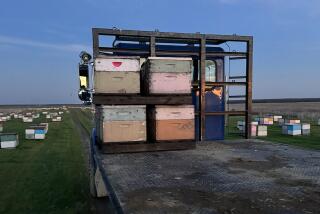Eva Crane, 95; united beekeeping enthusiasts globally
Eva Crane, an influential beekeeping authority who turned to the scientific study of bees after receiving a swarm of the insects as a wedding present, has died. She was 95.
Crane, who late in life wrote a noted world history of beekeeping, died Sept. 6 in Slough, England, after a brief hospitalization. Her death was announced by the International Bee Research Assn., which she founded in 1949. A cause of death was not released.
“She gave her life to the worldwide study of beekeeping, and I don’t know of any replacements for Dr. Crane on the horizon. Her wealth of knowledge was impeccable,” said James Tew, state specialist in beekeeping for Ohio State University, a center of bee research.
Trained as a nuclear physicist, Crane was 30 and a professor at the University of Sheffield in South Yorkshire, England, when she received a gift of a box of bees. The present would have been welcome in 1942 because sugar was in short supply during World War II.
Fascinated by the working beehive, Crane read everything she could in the university library about bees but was surprised that no scientific journal was devoted to the field.
Eventually, she would remedy that and much more as she almost single-handedly organized what had been a relatively unwieldy worldwide community of bee enthusiasts into a cohesive group dedicated to gathering and disseminating scientific research.
“She had the presence of mind, the passion to do it and the intelligence to carry it off,” said Kim Flottum, who has edited Bee Culture, the magazine of American beekeeping, for more than 20 years. “Her ambition to continue to collect information was just astonishing.”
From 1949 to 2000, Crane visited at least 60 countries and was known to arrive at a remote destination by dog sled or dugout canoe to lecture and teach governments about beekeeping practices. She often claimed she learned more than she taught.
In Vietnam, she encouraged women to work with native honeybees and helped the country increase honey exports. On a trip to Nepal, she observed honey hunters who extracted the substance from honeybee nests lodged in the rock faces of the Himalayas. And in a remote corner of Pakistan, she discovered that beekeeping was being practiced in a way she had seen only in excavations of ancient Greece.
She reflected on her travels in “Making a Beeline” (2003), one of several books she wrote. “The World History of Beekeeping and Honey Hunting,” published when she was 87, is considered a masterpiece for its encyclopedic scope. “Honey: A Comprehensive Survey” (1975) is also highly regarded as a reference work.
She was born Ethel Eva Widdowson on June 12, 1912, in London, the younger daughter of a stationer and a dressmaker. Her sister, Elsie, became a prominent British nutritionist.
At King’s College at the University of London, Crane studied physics and mathematics, graduating in 1933. She went on to earn a master’s in quantum mechanics and a doctorate in nuclear physics.
“I was the only woman studying physics at the time, but it never bothered me,” she later recalled. “I have often been the only woman. . . but I have never been discriminated against.”
Her marriage to James Alfred Crane, a stockbroker who served in the Royal Navy Volunteer Reserve, and the resulting wedding gift that buzzed sent her toward the permanent study of apiculture, or the raising and care of bees.
She started by joining a local beekeeping organization, but in 1949 she began leading a new group now called the International Bee Research Assn. that was established to emphasize the scientific study of the field.
“I was appointed ‘director,’ ” Crane later recalled. “Much too pompous.”
Soon she was editor of Bee World, a magazine that had served amateur beekeepers since 1919. When scientists balked at publishing research in Bee World, she started a scientific journal in 1950 and told them they could name it. They called it Apicultural Abstracts.
In 1962, Crane established another forum, the Journal of Apicultural Research, to help disseminate the wealth of new research.
She edited all three publications and led the organization for 35 years.
Crane also helped the association build a collection of about 60,000 scientific papers and 130 bee journals, many dating to their first issues in the 19th century. Called the Eva Crane Library, it is “probably the world’s leading repository of information on bees,” Flottum said.
The Times of London reported earlier this month that Crane marveled at how the world’s “curious passion for a small insect can transcend barriers . . . and bring strangers together as friends.”
Her husband died in 1978.
--
More to Read
Sign up for Essential California
The most important California stories and recommendations in your inbox every morning.
You may occasionally receive promotional content from the Los Angeles Times.











